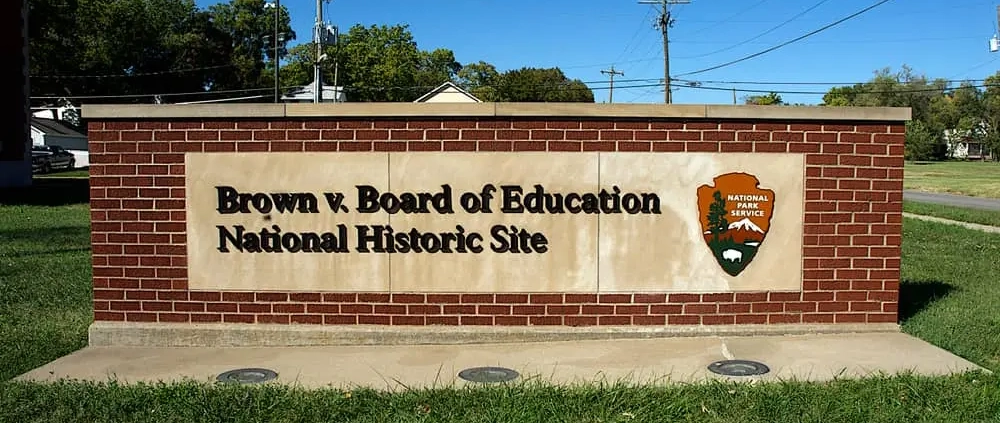Seventy Years After Brown, Our Work to Advance Equal Justice Continues
Editorial credit: mark reinstein / Shutterstock.com
By Leslie Proll
On this 70th anniversary of Brown v. Board of Education, we pause to celebrate the extraordinary and enduring significance of this groundbreaking decision — but also to recognize that much of its promise of equality remains unfilled.
Although we have made enormous strides in our collective pursuit of equal opportunity, hard work is still ahead of us. Our schools are resegregating at a rapid pace, states are banning the teaching of civil rights history, and our decades-long march towards increased diversity and representation has been abruptly interrupted thanks to a recent Supreme Court decision striking down affirmative action programs in universities.
Unquestionably, this is a moment to take stock of our democracy. Rooted in both the Constitution and the rule of law, the Brown decision promised to open doors for all Americans to equal opportunity and participation in every aspect of life, including civic life.
Dr. Martin Luther King, Jr. recognized early on that the high court’s command to integrate our public schools, and soon thereafter every other institution, was insufficient if not accompanied by full political participation for Black Americans. On the third anniversary of the Brown decision in 1957, he and two of the founders of The Leadership Conference on Civil and Human Rights, A. Philip Randolph and Roy Wilkins, held a rally in Washington, D.C. to urge the president and Congress to fulfill the promise of Brown by passing voting rights legislation. Dr. King delivered one of his most powerful speeches, “Give Us the Ballot,” which linked directly the pathway to equal opportunity to the power of the vote.
In his speech, Dr. King referred to the Brown decision as a “great beacon light of hope to millions of disinherited people throughout the world who had dared only to dream of freedom” and emphasized the inseparable link between equal opportunity and political participation. But he warned that opposition to “this noble and sublime ruling” was only growing in intensity and that many states were openly defying the law. Most concerning to Dr. King were actions to prevent Black people from registering to vote, saying that “The denial of this sacred right is a tragic betrayal of the highest mandates of our democratic tradition.” For that reason, his most “urgent request” to the president and Congress was “to give us the right to vote.”
The response from the president and Congress was not enough to halt the litany of disfranchisement schemes fueled by opponents of Brown. The Civil Rights Act of 1957 established the Civil Rights Division of the Justice Department and authorized officials to seek injunctions against voting discrimination. The Civil Rights Act of 1960 allowed federal inspection of local registration polls and created penalties for obstructing the vote. The Civil Rights Act of 1964 banned unequal requirements for voter registration and prohibited denying the right to vote based on non-material errors.
But it was not until Bloody Sunday in Selma — where former Rep. John Lewis and hundreds of voting rights marchers were assaulted and beaten on the world stage — that President Johnson and Congress would deliver the Voting Rights Act of 1965 (VRA). The VRA outlawed voting discrimination and required jurisdictions with a history of voting discrimination to seek preclearance of voting changes from the Department of Justice or a federal court. Its impact was immediate; by the end of the year, a quarter of a million new Black voters had registered.
For decades, the VRA worked to block and redress voting discrimination and help make our democracy more inclusive. On four separate occasions, Congress reauthorized the VRA — widely known as our nation’s most successful civil rights law — and each was signed into law by a Republican president.
Then came the Supreme Court’s devastating ruling in 2013 to gut the heart of the VRA — the requirement that jurisdictions seek preclearance of voting changes to ensure they are not discriminatory. The impact of Shelby County v. Holder was immediate and disastrous, with states and local jurisdictions racing to enact discriminatory provisions in every way, shape, and form.
These deliberate barriers to the ballot have continued in ferocity and intensity for the almost 11 years since the Shelby County decision; astonishingly, they are still on the rise. States and localities keep coming up with new “conniving methods,” as Dr. King called them in his 1957 speech, to suppress the vote. And the discrimination unleashed by Shelby County is not confined to jurisdictions previously covered by the VRA’s preclearance requirement — it is rampant everywhere. This is causing cumulative harm to voters of color who must navigate not only the most recent restrictions, but those piled on year after year, further constricting their ability to participate in the political process.
Unfortunately, we are unable to rely on litigation alone to redress the constant assault on our voting rights in any significant way. Lawsuits are time-consuming, costly, and can only challenge discrimination on a case-by-case basis. With southern courts packed with extreme judges who are hostile to voting rights, a rare victory in the district court is often reversed on appeal. And, the Supreme Court has substantially weakened what remains of the VRA. One federal appellate court also recently ruled that voters of color can no longer even pursue claims under this law.
Instead, as Dr. King urged in the wake of the Brown decision, we must demand the president and Congress protect the right of everyone to vote, regardless of their race or background. We need legislative remedies that will immediately and permanently restore the ability of every citizen to fully participate in democracy. Congress can and should pass at the very first opportunity a trifecta of voting rights bills that would reinstate and strengthen the provisions of the VRA and expand access to the ballot in a host of meaningful ways for communities of color. And President Biden should continue urging Congress to do so until it happens.
The John Lewis Voting Rights Advancement Act, which has been blocked by anti-voter forces in Congress for more than a decade, would block discriminatory provisions at the outset — such as Alabama’s SB 1, which just made it a felony punishable by 10 years to assist a voter in accessing an absentee ballot — and would strengthen other provisions of the VRA that have been undermined by the Supreme Court.
The Freedom to Vote Act would set a national baseline for expanding access to the ballot. All voters in the country, regardless of their zip code, would enjoy access to automatic, same-day, and online voter registration, early voting, and standardized mail voting, and they would be protected from unlawful voter purges and partisan gerrymandering.
The Native American Voting Rights Act would ensure equitable registration, early voting, and election day polling places on Native lands, provide accommodations for Native voters lacking residential addresses or at-home mail delivery, and require universal acceptance of tribal IDs.
In his “Give Us the Ballot” speech, Dr. King recognized that the right to vote is foundational and protects all other rights and freedoms: “Give us the ballot, and we will no longer have to worry the federal government about our basic rights.” Today, we face an intersectional moment where every freedom and right we enjoy is in jeopardy. From reproductive rights to climate justice to labor rights to protecting against LGBTQ discrimination, the pathway for change that our communities seek is through the ballot — at the federal, state, and local level.
As we celebrate 70 years of the most momentous Supreme Court decision in the history of our democracy, we echo Dr. King’s prescient words from long ago to call upon Congress and President Biden to meet the “urgent need for dedicated and courageous leadership” — and to give us the ballot once again.
Leslie Proll is the senior director of the voting rights program at The Leadership Conference on Civil and Human Rights.












Leave a Reply
Want to join the discussion?Feel free to contribute!